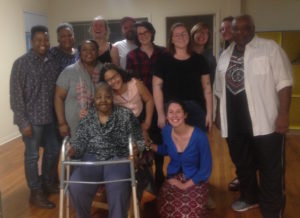
Name: Elizabeth Welliver
Age: 25
Relationship to the Collective (or the event): Young Adult Volunteer, part-time worker for the Collective, Attended Citizen: An American Lyric – Book Discussion: April 15, 2018
Describe the event in three sentences or less: A spirit-filled discussion of Claudia Rankine’s Citizen: An American Lyric. The group was intergenerational, interracial, and of a variety of Christian backgrounds. We asked hard questions about what this text requires of white people and people of color in light of persistent state-sponsored racial violence.
What did you notice during or about this event?
I had read Citizen before in an academic setting for a poetry course four years ago. While then I recognized the boldness of its language, the embodied meaning came alive for me in a discussion with people of color. The people that livedaily experiences of racism and anti-blackness were now living, breathing, resilient beings in front of me, reading and speaking in their own voices. The group called my attention to the frequency of Rankine’s portrayal of injury: “How to care for the injured body, / the kind of body that can’t hold the content it is living?” Racism is a perpetrator of constant affliction, injury, insult, wound after wound, targeting children and women of color first. During our discussion, I felt aware in a physical way how white supremacy injures our society and the children of God whom I know and love.
What impacted you the most?
I was most impacted by one participant’s description of an aggression she experienced at her workplace when she was not treated equally or taken seriously as a Black woman. She attended with her whole family, and described her family upbringing in knowing how to respond to such discrimination. The moment of turning for me was when she turned to look at her mother, and said, “Mama always taught me to pray for them. Just pray for them.” This was radical to me because it was an example of Jesus’ instruction to pray for your enemies, even those who persecute you. This moment showed me that even when she experienced despair, anger, and hurt, her prayer life was vital to remain in relationship with white people.
What impacted you the least?
I was least impacted by the time. While we shared two hours of thoughts, I had a keen sense that time was passing without notice because we were engaged in listening and sharing.
What about this event struck you as spiritual and/or carried spiritual significance for you?
The event was a brave space where people of color openly shared their encounters with racism and white people listened, and offered supporting stories. It felt like a true privilege to receive the stories of others, a window into a different reality that exists parallel to my own privileged existence. The sharing of those stories felt holy because each story gave us palpable memories to carry. Christ’s body calls us to share communion in remembrance of him.
“Yes, and the body has memory,” Rankine writes.
I see us now carrying each others’ stories as a way of remembering Christ’s love and the ways we are connected as his body.
What new or next thing, if anything, did this experience inspire you to do/be/or try in the future?
The event invited me to see that the wound of racism is so deep in America that no one community or group can address it alone. We need more white people to name the sin for what it is: evil. I came away from our discussion moved to develop a better understanding of race and racism from a biblical perspective. I am also reading When They Call You a Terrorist: A Black Lives Matter Memoir by Patrisse Khan-Cullors and asha bandele to keep the voices of Black women alive in my mind and body. I am deeply grateful to the participants and the organizers for this vital event.






